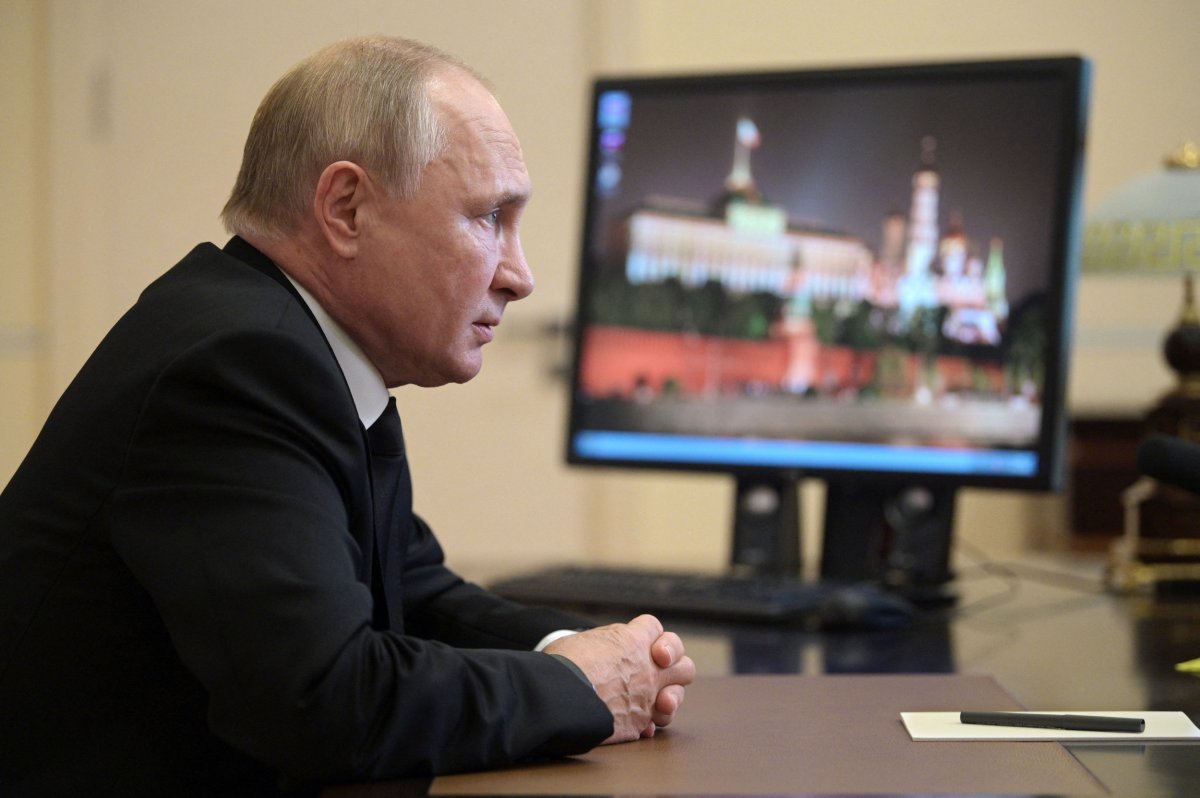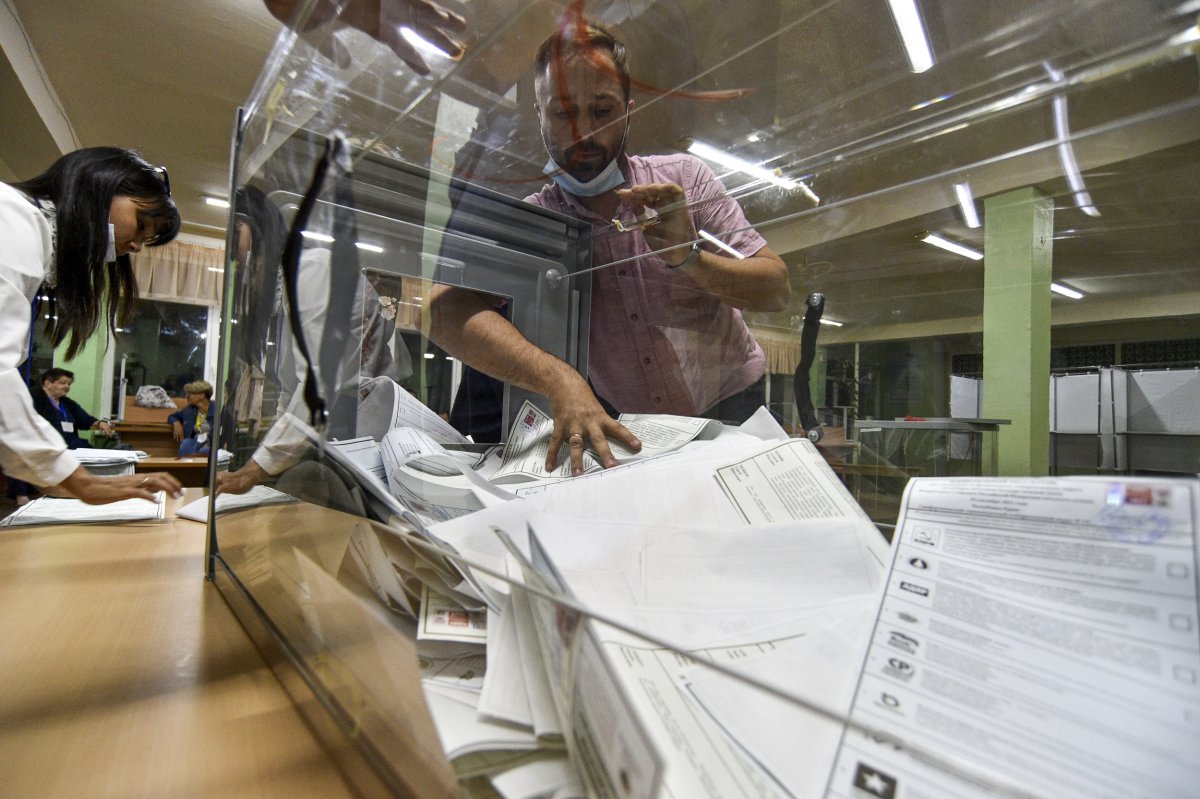The recent Russian elections were tainted by multiple reports of violations, including ballot stuffing, with the ruling pro-Kremlin remaining in power.
In the elections for state parliament seats, results from nearly 99 percent of the country's polling stations gave the ruling United Russia party 49.8 percent of the vote for 225 seats apportioned by parties. For the 225 seats chosen directly by voters, United Russia candidates lead in 198 races, according to the Central Election Commission.
Ella Pamfilova, the chair of the Central Election Commission, confirmed United Russia has retained the two-thirds constitutional majority in the parliament.
However, the vote has been disputed as there have been numerous reports of violations, including ballot stuffing. Videos circulating on social media showed people trying to shove piles of ballots into boxes, and brawls with election monitors were also caught on camera.
For more reporting from the Associated Press, see below.

The vote has been watched closely for any signs that Putin's control might slip, however slightly, ahead of the 2024 presidential election. It's not yet clear whether Putin will run again, choose a successor or outline a different path — but he is expected to keep his hand on the tiller whatever he decides, and an obedient State Duma, or parliament, will be crucial to those plans.
In fact, the results indicated there would be almost no opposition voices in the Duma at all, with three other parties that usually toe the Kremlin line set to take many of the remaining seats, along with the New People party, which was formed last year and is regarded by many as a Kremlin-sponsored project.
According to Pamfilova, candidates from three other parties each won a seat, so in all eight political parties will be represented in the Duma. Voter turnout stood at 51.68 percent, Pamfilova said.
The Communist Party received 19 percent of the party-list vote, a sizable improvement from the 13 percent it got in the last election in 2016. United Russia got about 54 percent five years ago, so the results indicate some falloff in support.
But concerns that the results had been manipulated mounted Monday, with many decrying that a breakdown of the online voting in Moscow was still not available to the public. The results in the other six regions that were allowed to vote online have been detailed. In Moscow, approval of the ruling party has always been particularly low and protest voting has been widespread, and candidates from the Communist Party were calling for protests of the vote later in the day.
Any fraud allegations aside, the Kremlin sweep was widely expected since few opposition candidates were even allowed to run this year after Russian authorities unleashed a sweeping crackdown on Kremlin critics.
Organizations linked to imprisoned opposition leader Alexei Navalny have been declared extremist, and anyone associated with them was barred from seeking public office by a new law. Navalny is serving a 2½-year prison sentence for violating parole over a previous conviction he says is politically motivated.
Other prominent opposition politicians faced prosecution or were forced to leave the country under pressure from the authorities.
Navalny's team still hoped to make dents in United Russia's dominance with their Smart Voting strategy, which promoted candidates who had the best chance at defeating those backed by the Kremlin. However, a massive effort by authorities to suppress the strategy has been underway in recent weeks.
The government blocked the Smart Voting website and pressured Apple and Google to remove an app featuring it from their Russian online stores — a move the tech giants took as voting began Friday. Google also denied access to two documents on its online service Google Docs that listed candidates endorsed by Smart Voting, and YouTube blocked similar videos. In addition, the founder of the Russian messaging app Telegram, Pavel Durov, on Saturday disabled a Smart Voting chatbot set up by allies of Navalny.
Durov said he wanted to respect the laws prohibiting campaigning on voting days, but critics quickly pointed out that they didn't disable similar chatbots imitating Smart Voting and didn't remove the Moscow mayor's call to vote for United Russia candidates.
Apple and Google did not respond to a request for comment. However, a person with direct knowledge of the matter who spoke on condition of anonymity because of the sensitivity of the issue, said that Google was forced to remove the app because it faced legal demands by regulators and threats of criminal prosecution in Russia.
Some Kremlin critics said that there were as many violations as in 2011, when reports of mass fraud in the parliamentary election triggered months of anti-government and anti-Putin protests. Pamfilova maintained, however, that there were fewer violations this year than before. She said that in total, 25,830 ballots in 35 regions have been invalidated.
Putin's spokesman Dmitry Peskov said Monday that the Kremlin views the election "quite positively" in terms of its "competitiveness, transparency and fairness."
The election this year was extended to three days, and in seven of Russia's 80-plus regions voters were offered the option of casting their ballots online. Officials said the measures were taken to reduce crowding at the polls during the coronavirus pandemic, but election monitors said that they created more room for manipulating the results.
There were particular concerns about voting in Moscow, where nearly 2 million votes were cast online, and the results of some races changed dramatically at the last minute on Monday.

Uncommon Knowledge
Newsweek is committed to challenging conventional wisdom and finding connections in the search for common ground.
Newsweek is committed to challenging conventional wisdom and finding connections in the search for common ground.
About the writer
To read how Newsweek uses AI as a newsroom tool, Click here.








